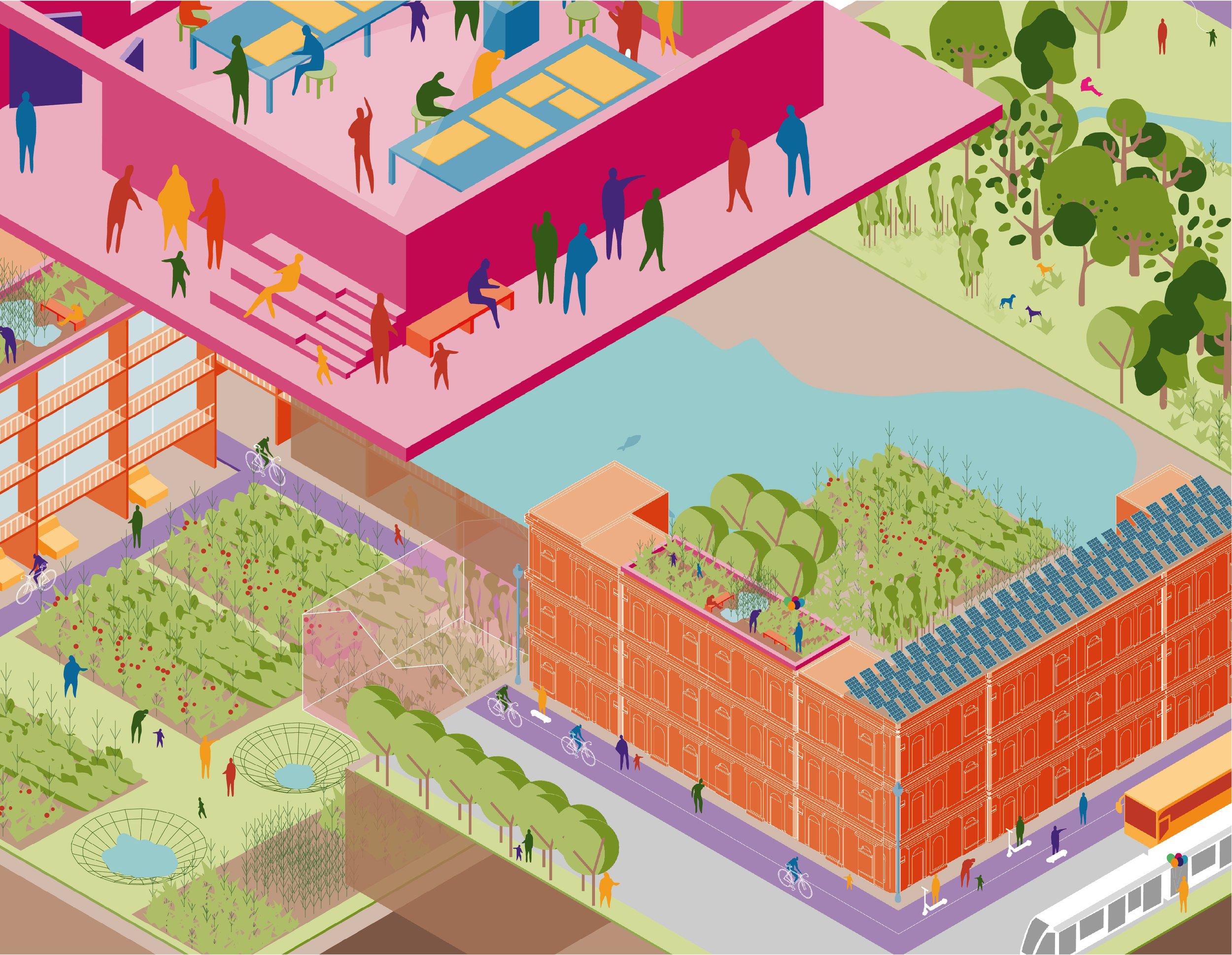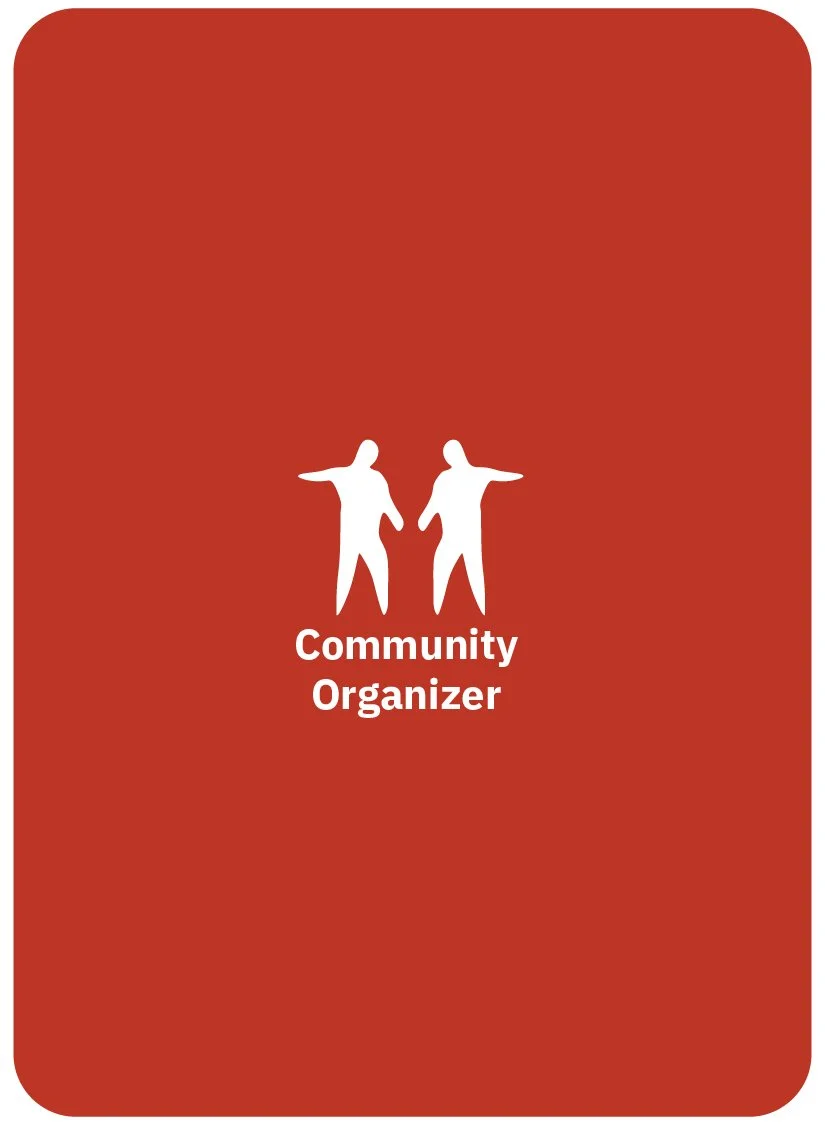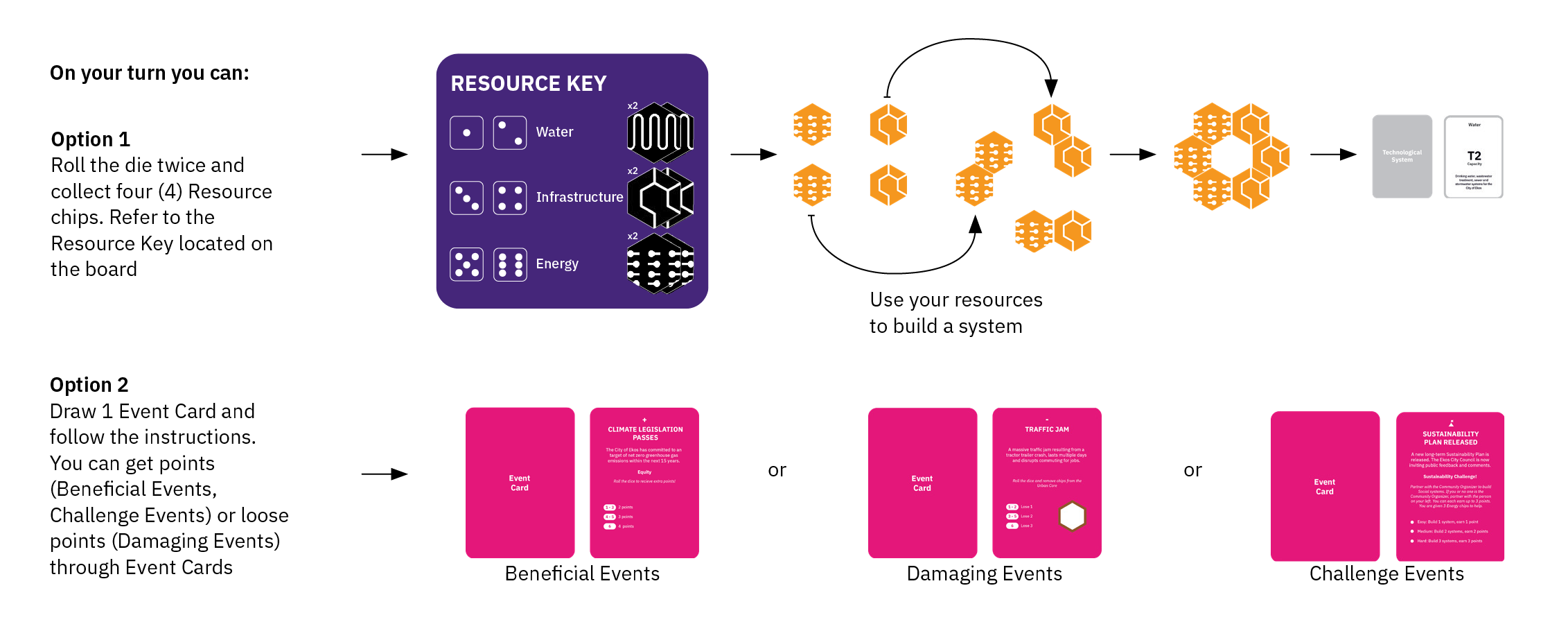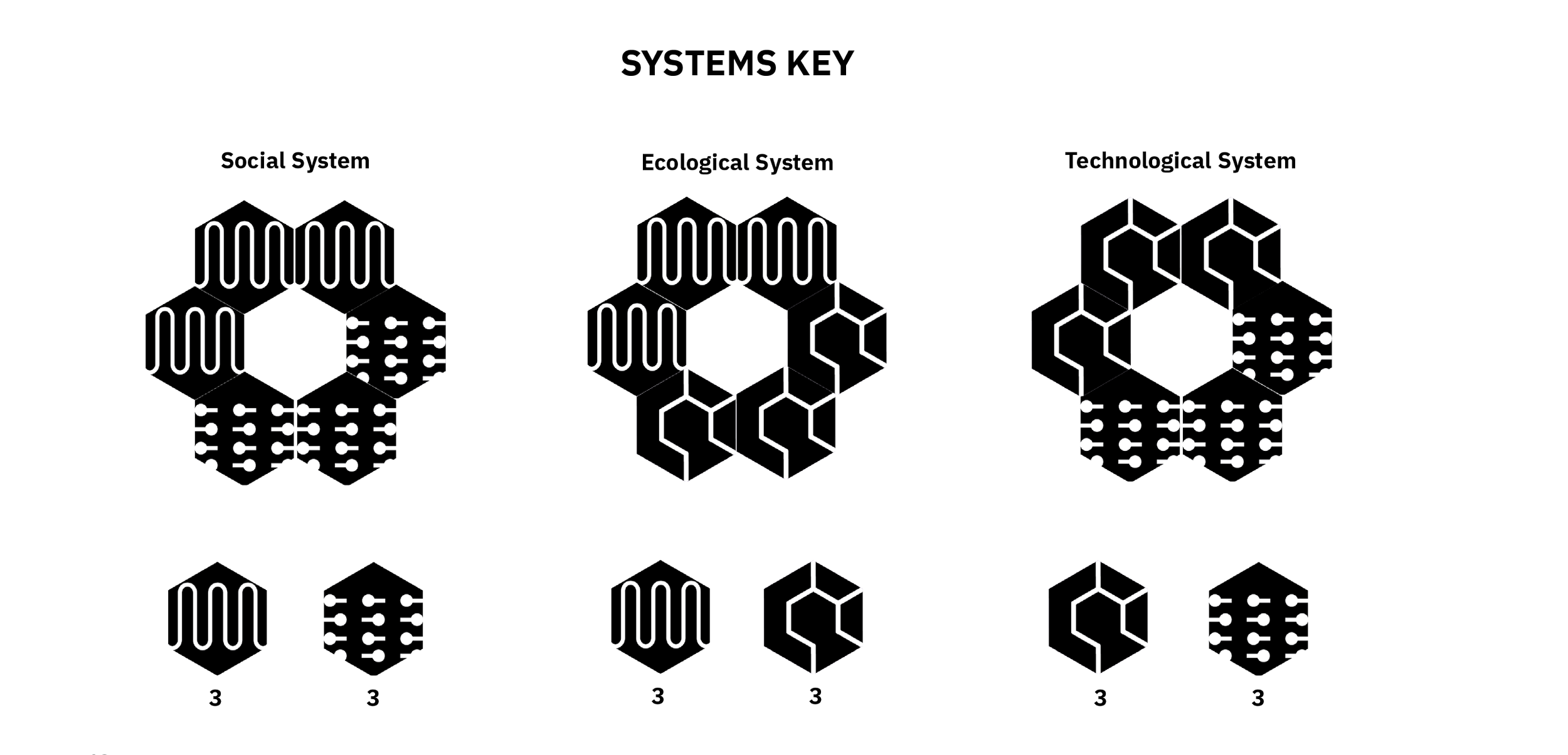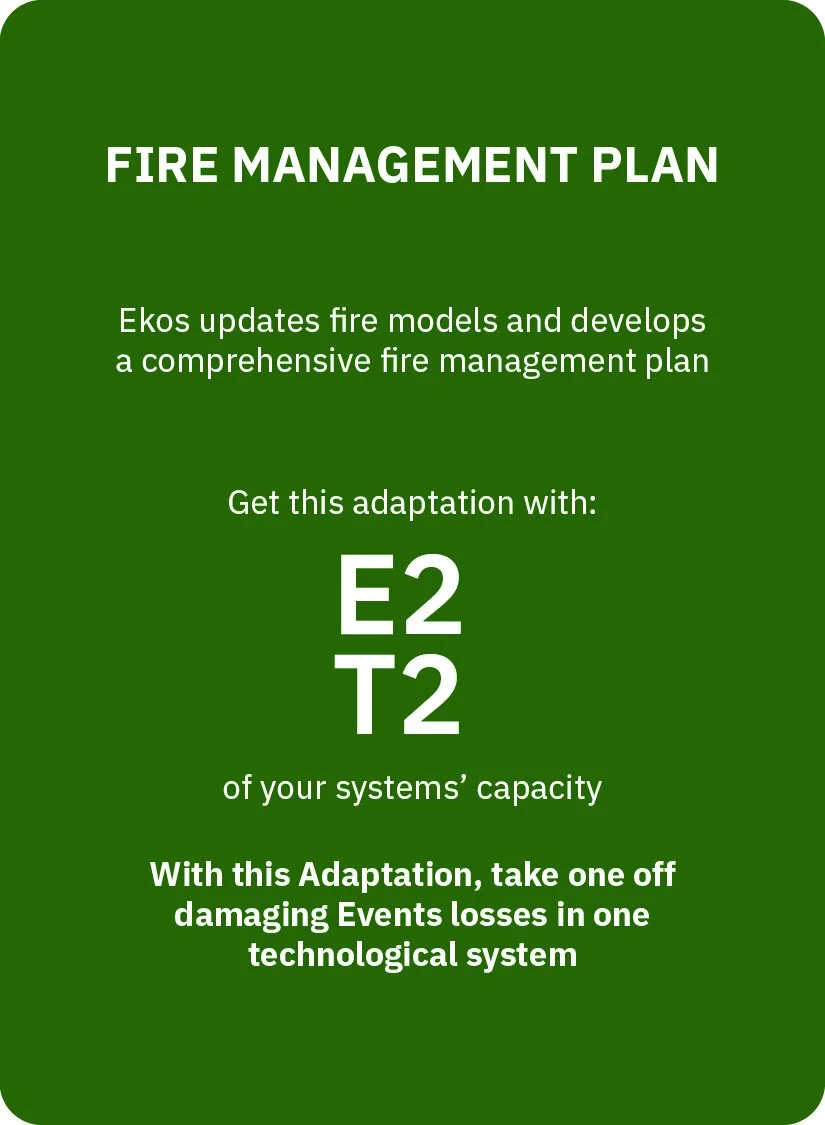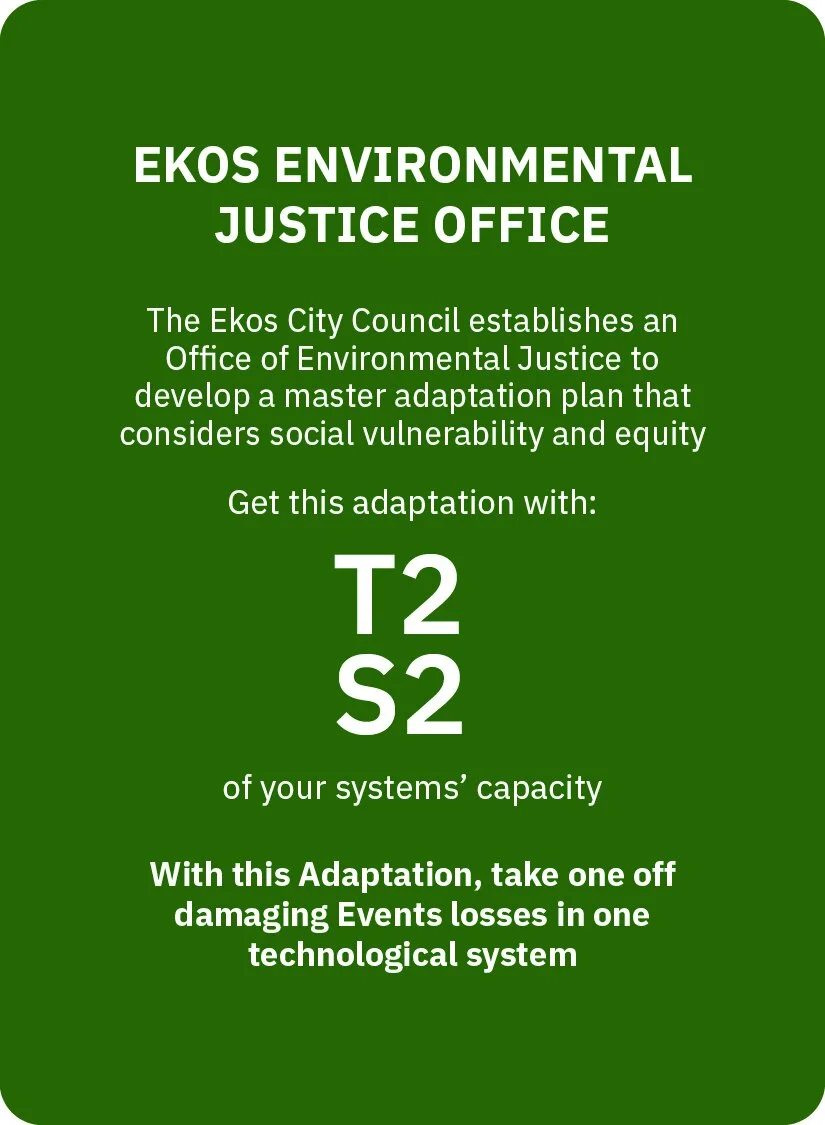HOW TO PLAY
Welcome to the City of EKOS
Objective
During the game of Ekos, players alternate between building Social, Ecological, and Technological Systems (SETS), and responding to a diverse range of Events. Working cooperatively to complete challenges earns you Ekos points. Each player takes on the role of an actor within the City of Ekos - a City Council Speaker, City Planner, Community Organizer, Ecologist, Designer, and Modeler - and must fulfill one of 6 unique missions to make Ekos more sustainable and equitable in the face of climate change and other challenges.
The objective of Ekos is to be the first person to earn 15 Ekos points. Refer to the Actor Cards to learn more about your Actor Mission, by accomplishing it you get +5 bonus points!
Step 1: Setting Up the Game
Sit in a circle with the Game Board in the middle. Place the Event cards in the corresponding place on the board and arrange the System, and Adaptation Cards around the board where everyone can access them. Flip the top three Adaptation Cards and arrange them in a line next to the pile.
Everyone chooses an Actor Card randomly, take note of your Actor’s ability and mission. Draw six (6) Resource chips randomly from the corresponding actor color to start.
Roll the die to determine who will go first. The player who rolls the highest number goes first, followed by the person to their left.
For Beginners: To get started, practice building a system. A system is a certain combination of six (6) chips arranged in a circle on the board. Refer to the System Key to see what chips make up each system. A social system must include 3 water and 3 energy resource chips. An ecological system must include 3 infrastructure and 3 water resource chips. A technological system must include 3 energy and 3 infrastructure resource chips. Share your system with the other players by adding to a system already on the board. Intersecting systems are allowed.
Now you are ready to play!
Choose an Actor!
-
The City Council Speaker carries out the Ekos City Council’s legislative and policy objectives. The Speaker also consults with the City’s Attorney, who advocates and resolves disputes, reviews and develops contracts, and provides legal counsel
-
Ability
-
Description text goes here
-
The Ekos City Planner is primarily responsible for managing and coordinating citywide development and infrastructure projects. The City Planner works with the Speaker, Community Organizer and urban planners to determine future plans for the City of Ekos.
-
Once per game, the City Planner may collect four (4) Resource chips of choice.
-
The City Planner’s mission is to build five (5) technological systems
-
The Designer plays a key role in the City of Ekos’ planning department, assisting the City Planner in developing urban design projects and masterplans, and producing data visualizations to communicate scientific concepts and outcomes.
-
Once per game, the Designer may collect four (4) Resource chips of choice.
-
The Designer’s mission is to build five (5) social systems
-
The Community Organizer is involved in a number of coalition building efforts, and provides a forum for Ekos community members to share their voice.
-
Twice per game, the Community Organizer may roll the die twice and collect the corresponding four (4) Resource chips on their turn in addition to standard actions.
-
The Community Organizer’s mission is to build five (5) social systems
-
The Modeler uses a variety of tools such as Geographic Information Systems (GIS) to share relevant data and develop possible scenarios for future planning in the City of Ekos.
-
Twice per game, the Modeler may look at the top two (2) Event cards, pick one (1), and put the discarded card on the bottom of the deck.
-
The Modeler’s mission is to build three (3) ecological systems and two (2) technological systems
-
The Ecologist’s role is to help monitor, research, and advocate for the City of Ekos’ ecological systems - including green and blue spaces and green infrastructure.
-
Twice per game, the Ecologist may look at the top two (2) Event cards, pick one (1), and put the discarded card on the bottom of the deck
-
The Ecologist’s mission is to build five (5) ecological systems
Step 2: Play Ekos
To start the game, play the first round! During the first round, each player must roll the die (twice) and collect the corresponding four (4) Resource chips. Everyone must try to build at least one (1) complete system on the board (during their first turn). In subsequent rounds, when choosing to place Resource chips on the board, they don’t need to be used solely for completing a system.
During all subsequent rounds, whenever it is a player’s turn, that player may choose to roll the die (twice) and collect the corresponding four (4) Resource chips OR draw one (1) Event Card.
At any point during your turn you can get Adaptation Cards. Each card protects one social, ecological, or technological system at a time in case of a negative event. Three Adaptation Cards must always be flipped facing up next to the Adaptation Cards’ deck, players can choose to use their systems’ capacity to get any of those three Adaptations. Every time an Adaptation is acquired a new Adaptation card must be flipped.
The game continues until one player achieves 15 points. Once a player has achieved this, they must announce it and the current round must be played to completion. If the winning player does not lose any points or systems for the duration of the round, they win the game! If they do lose points or systems, that player is out of the game and the game continues.
If you are running out of time and no player has reached 15 points, the player with the most points wins.
If an actor accomplishes their mission, they get +5 bonus points! (each player can claim their bonus points once per game)
TIPS FOR BUILDING SYSTEMS
Refer to the System Key on to see what chips make up each system. Systems can intersect each other.
Every time you build a system, draw one corresponding System Card.
There’s no limit to the amount of chips you can play during your turn, but remember to use them wisely.
You can place chips on the board that do not result in building a system.
You may save resources by building off a system that is already on the board. However, whichever player has the majority of the chips in the system is the player that gets the System card for that system. It is possible (and encouraged!) for two, three or even six players to share a system if they all have an equal number of chips in the system. In this case, all players sharing the system would each get a System Card.
RESOURCES AND EVENT CARDS
To get resources (for building systems) you can choose to roll the die twice during your turn and collect the corresponding four (4) Resource Chips. Take a look at the Resource Key printed on the board.
Completing the challenges on Event Cards earns you Ekos points.
You can still build systems during your turn if you choose to draw an Event Card.
Not every Event Card contains a challenge. Some may damage your systems or require you to give up resources. Different symbols on the Event Cards distinguish Challenge, Beneficial, and Damaging Events.
If you are unable to complete the challenge on an Event Card, you lose your next turn. You are out of the game if you fail to complete three challenges.\
Game Mechanics in Detail
-
You may save resources by building off a system that is already on the board. However, whichever player has the majority of the chips in the system is the player that gets the corresponding System card. It is possible (and encouraged!) for two, three or even six players to share a system. If they have an equal number of chips in the system, all players sharing the system would each get a System Card. If any chips are removed from a system, everyone sharing the system loses the corresponding System Card. Similarly, if a shared system is protected by someone’s Adaptation, the whole system is protected.
-
Adaptations protect your systems from the effects of Damaging Events. The Adaptive Capacity of systems (look at your system cards) is required in order to obtain Adaptations. You can get Adaptations at any point during your turn as a way to protect your systems, or as part of a Challenge Event Card to earn points.
All Adaptations require four (4) Adaptive Capacities. Each system has either one (1) or two (2) Adaptive Capacity that can be added up to get Adaptations. Refer to the System Card to see how much Adaptive Capacity a system has.
To use a system’s Adaptive Capacity, flip the System Card over so it is face down. Leave the System Card flipped over. The Adaptive Capacity of your systems will recharge after a round. To recharge, flip back (facing up) the System’s Cards you used.
Players can pool their systems’ Adaptive Capacity to get Adaptations, but they cannot share them, each adaptation card must belong to one player. There should always be three Adaptation cards facing up next to the Adaptation Card deck from which you must pick when obtaining one. After you collect the card, replace it with one from the deck.
After obtaining an adaptation, keep the card in front of you. Adaptations protect against Events that require you to remove chips off the board or freeze your system’s capacity. Adaptation cards specify which type of system they protect, these can be social, ecological or technological. Each Adaptation can protect only one system at a time.
-
Read all Event Cards thoroughly and follow the instructions. There is always risk involved when drawing an Event Card. Event Cards may provide opportunities for players to earn points, or they may damage systems. The best way to prepare for a damaging event is to have extra resources available, and gain Adaptations.
Challenge-based Event Cards focus on real-world problems related to the Resilience, Equity, or Sustainability of cities. Challenges may include building specific systems, gaining Adaptations, or collaborating with other players.
If chips are ever removed from a system, you and everyone sharing the system lose the corresponding System Card.
If a player is unable to complete the challenge on an Event Card, they lose their next turn. If a player fails to complete a total of three challenges, they are out of the game
-
There are trade-offs associated with the different zones on the board (Coastline, Urban Core, and Green Spaces). Event Cards may benefit or damage systems that are built in certain zones. For example, a Coastal Flood will only affect systems in the coastal zones.
If any part of a system is within a zone on the board, that system is counted as part of that zone. If any system overlaps with more than one zone, the system is subject to Events related to both zones. It is possible for a system to be within all three zones.
Different zones on the board may be impacted by Events in different ways.
-
At any point during your turn you may trade Resource Chips with other players and/or the Ekos Coop (the pile of chips not in play). When trading with the coop, you must trade three (3) of one type of Resource Chip for one (1) of a different type. When trading with other players, you can negotiate in each case. Use the Ekos Coop to facilitate equal exchange while keeping the same color of chips.
Step 3: Ending the Game
In order to win, a player must earn 15 Ekos Points. Remember, they must announce this to all players, and the round must be finalized. If the player with 15 points does not lose any points or systems for the duration of the round, they win the game!
If no player earns all 15 points, the player with the most points wins. Other ideas to keep the game shorter are agreeing on a certain number of rounds for the duration of the game or playing up to 10 points.
At the end of the game, the winning player is invited to speak to the City Council about the state of Ekos after game play. Together with other players discuss the status of Ekos' interconnected systems, and share any recommendations for the future of the City. What changes or initiatives would you like to see? How will Ekos adapt to a changing climate? And how can planning and design be more equitable for all? We also invite all players to reflect on any real-world events or challenges that might be similar to what you experienced during the game.
GLOSSARY
-
Sustainability is the ability of a system to endure and sustain resources over time. Some Event cards will require you to complete a Sustainability Challenge.
-
Resilience is the ability of a system to withstand and recover from stressors or extreme events. Some Event cards will require you to complete a Resilience Challenge.
-
Equity has many meanings and histories, but is often discussed as the fair distribution of resources and wealth primarily in response to forms of structural racism and classism. In Ekos, equity is a critical component of systems building, resource distribution, and collaboration amongst actors.
-
Points a player can gain when completing an Event Challenge
-
Water, energy and infrastructure resources which are needed to build systems in the City of Ekos.
-
Adaptations encompass a wide range of social, ecological and technological solutions to not only mitigate the impacts of climate change and extreme weather, but also aim to make systems more resilient and adaptive to ongoing hazards and threats. In Ekos, adaptations can protect your system from some damaging events. Some Event Challenges allow a player the opportunity to gain Adaptations by adding up the Adaptive Capacity of their systems.
-
This is the ability of a system to cope or adjust to environmental, social or technological changes. The greater the capacity, the more likely the systems’ functions and benefits are maintained.
-
A system is a combination of six resource chips arranged in a circle on the board. Everytime you build a system, you earn one System Card.
-
Players in the game of Ekos. They include a Modeler, Designer, Ecologist, City Planner, City Council Speaker, and Community organizer.
-
Each round players have the opportunity to draw an Event card which will describe an event that happens in the City of Ekos. Follow the instructions and actions outlined in each Event Card. Roll the dice to determine the required action. If any player is unable to complete an action 3 times, they lose the game for their actor.
FAQ
-
To win, you must earn 15 Ekos Points. Remember that if you complete the Actor’s Mission, you get +5 bonus points!
-
Sharing systems is a smart way to save resources and collaborate with other players. But remember, whichever player has the majority of the chips in the system is the player that gets the System card for that system. If all players have an equal number of chips in a system, each player gets a system card.
-
Yes, but you cannot obtain additional resource chips (you can’t roll the die).
-
Event cards include symbols and labels which indicate if they are a Sustainability, Resilience or Equity Challenge, or beneficial or damaging Events. If not specified, the event affects the person that draws the card.
-
Adaptations protect your systems from the effects of some Events and also earn you points. The Adaptive Capacity of systems is required in order to obtain Adaptations. To use a system’s Adaptive Capacity, flip the System Card over so it is face down.
-
Yes.
-
Adaptive Capacity is a system’s ability to change and withstand Events. Each system has either one (1) or two (2) Adaptive Capacity that can be added up to get Adaptations. Refer to the System Card to see how much Adaptive Capacity a system has.
-
All players will roll the die to determine who goes first. The player that rolls the highest number will start. If 2 or more players tie, continue rolling the die until someone rolls a higher number.
-
If you build a system in more than one geographic zone, the system will be equally impacted by any damaging event or event challenge specific to that region.
-
A system is a combination of six resource chips arranged in a circle on the board. Every time you build a system, you earn one System Card.
-
To build a system you need 6 resource chips arranged in a circle on an available space on the board.
-
A social system must include 3 water and 3 energy resource chips. An ecological system must include 3 infrastructure and 3 water resource chips. A technological system must include 3 energy and 3 infrastructure resource chips.

